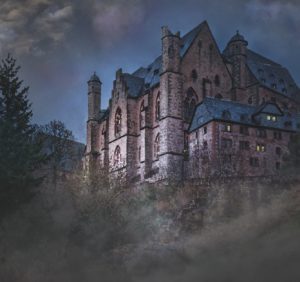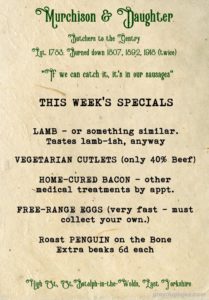From the Journal of J Linseed Grant, 11th April: “Apparently people want to know exactly who lives at my house. Why, I cannot imagine. I spend much of my time trying to forget or avoid them all. Still, if it distracts the solicitors, I suppose it might be worth it…” (Fragment recovered from two passing ducks, possibly Methodist but with a hint of Non-Conformism)
Today, dear listener, we at greydogtales are busy preparing a new round of features and interviews. We have many weird and supernatural fiction articles, interviews, exciting projects and lurchery things to come, so we shall have a brief diversion.
We are in St Botolph-in-the-Wolds once more, with that old curmudgeon J Linseed Grant. And here is your exclusive cut-out-and-keep guide to the main inhabitants of Rhododendron House.

The House
Rhododendron House has lost large chunks of its East and West wings over the years, plus some of the centre. No one is sure how that happened. At least one storey disappeared entirely in the 1890s. This lowered the building by 16 feet, which surprised the Duchess of Filingdales, who was in that part at the time.
The house is also reputedly built over a Gateway to Hell, as might be expected, but that feature has long been covered by plywood and some hasty plastering.
A recent description runs thus:
“…It is large and gambrel-roofed, but only in parts where the roofbeams have collapsed. If an Elizabethan builder had lost a fight with a group of Amish alcoholics, this would have been the result. Crouched behind dense banks of rhododendrons, the house emits faint spirals of smoke from its dilapidated chimneys, and occasionally through holes in the roof. It stretches the word ‘disrepair’ so far that even the rats write to their local Member of Parliament and ask for better accommodation.”
Owned for many centuries by the Linseed Grant clan, it currently belongs to reclusive author J Linseed Grant, assuming he is still alive. As there have been no sightings of his cousins, Mortimer and Gerald Linseed Grant, since they abandoned their scandalous stage act, and vowed to climb Lake Tanganyika, he may indeed be the last true master of the house. See ‘Two Against the Waters: When Mountaineering Charts Go Wrong’ Albino Penguin Books (1954).
As the author himself has been well-documented through fragments of his journal, and his bombastic letters to other writers over the decades, let us focus on the rest of the household.
The Principle Players
Pride of place must go to MSHINDI CHEBOI, the under-gardener (there are no other gardeners, but see Note A below). A proud Swahili, but oddly enough the son of a Scarborough cobbler, Mshindi speaks his mother-tongue with a broad East Yorkshire accent, and knows absolutely nothing about gardening.
He is addicted to The Times’ crossword puzzle, has a healthy overseas investment portfolio, and yet acts as Linseed Grant’s main confidante and support in times of crisis.
His ancestors inhabit parts of the local woodland, and assist him in his constant struggle with the vengeful wraith of the Rhododendron-Woman. “Mwenye nguvu mpishe”, as he often says, which means either ‘Brain is better than brawn’, ‘Might is right’, or ‘Help, the bushes have my legs’. His accent makes it hard to tell.
MRS GUMWORTHY is their vindictive housekeeper and live-in cook. Spends much of her time devising toxic delicacies to incapacitate her employer, putting ground glass in the salt cellars and so forth. She is an indifferent housekeeper, and an atrocious cook, even when in a good mood.
She is known to have a sister in exile in Lancashire (for crimes against humanity), and a mother in Malton. Following the collapse of her project to market free-range Norwegian rats’ milk, she is currently between Grand Schemes.
Most of the actual housekeeping is done quietly and efficiently by HENRIETTA, the maid. Henrietta is a heavily-built former coal-miner, who used to fight dockers in Newcastle for sixpence a time. Won over by lace collars and the swish of taffeta, he insists on dressing in a full Edwardian maid’s outfit. He keeps his miner’s boots handy for heavy housework.
The Dogs
The house is occupied by up to three dogs, depending on circumstances. BOTTLES, a rather nervous lurcher, is frequently on loan to a local schoolboy. This leads to many jolly japes and exciting adventures, most of which he would rather avoid.
The permanent canine residents are two longdogs. THE BLACK DOG is an inveterate gambler and carpenter. She has a particular talent for constructing trebuchets and other wooden war-machines (despite her lack of opposable thumbs). She is lean, dominant, and often at odds with Mrs Gumworthy, with whom she shares a muzzle.
THE DOG BORN OF KANGAROO is an entirely different looking longdog. He is sometimes scurrilously described as what might result ‘when a daddy-dog and a mummy-kangaroo love each other very much’. Spends most of his time upside-down. He frequently runs away with Linseed Grant and Mshindi to hide in the potting shed when things get difficult. Amiable to the point of incompetence, his ideal night is a can of pilchards with the boys and a bottom-rub. His, not theirs.
The Sundry Horrors
FATHER is of uncertain age, but certainly Victorian and probably a Linseed Grant of the old line. With a snappish nature and the wrong number of legs, he is usually to be found dozing in his crib, either in the cellar or by the kitchen fire. He is somewhat corrosive, and inclined to lash out when disturbed. Fortunately he sleeps for some twenty three and half hours of the day.
What is assumed to be MOTHER occupies the attics, her crinoline-clad mass crashing against the roof-beams and dislodging the slates. Mrs Gumworthy tends to her, utilising a selection of iron chains, armoured aprons and long poles with hooks on them. No one looks too closely at who or what they are feeding, as long as they come away intact.
THE BUTCHER’S BOY, from Murchison and Daughter in the village, is perhaps the most frequent other visitor. He is a precocious child, given to quoting Greek philosophers whilst hiding links of Cumberland sausage under his apron. The Butcher’s Boy sleeps in the potting shed at certain times, especially when the local Girl Guides pack is loose.
We should add that a BADGER occasionally calls, either to gamble with the Black Dog or to be sick in the umbrella stand. The badger’s name is not known.
Gardening In Adversity
NOTE A: The rumoured succession of gardening staff at the house goes as follows:
- 1783-1847 – Harry ‘Margaret’ Coddle, a Peninsular War deserter. Once sold Wellington a diseased geranium, and wore women’s clothing for fifty years in case they found him.
- 1847-1848 – Gaston of Acquitaine, who had found himself in the wrong story.
- 1849-1873 – Several Hindoo Brahmins, exiled from their homeland for being too ‘touchable’.
- 1873-1914 – ‘Mad Jack’ Hepperthwaite, a village agitator and virulent opponent of vegetarianism. Remembered for shooting a row of carrots after they came up too easily. Died from injecting beef.
- 1914-1918 – M’sieur Alfonse Sellotape, a Belgian refugee who made a number of bad patent decisions.
Records vary after this, until the arrival of the present incumbent, Mshindi, a self-taught rhododendron wrangler.
Next time – weird and strange fiction news, probably, and maybe literary matters, horror, fantasy and the like…


